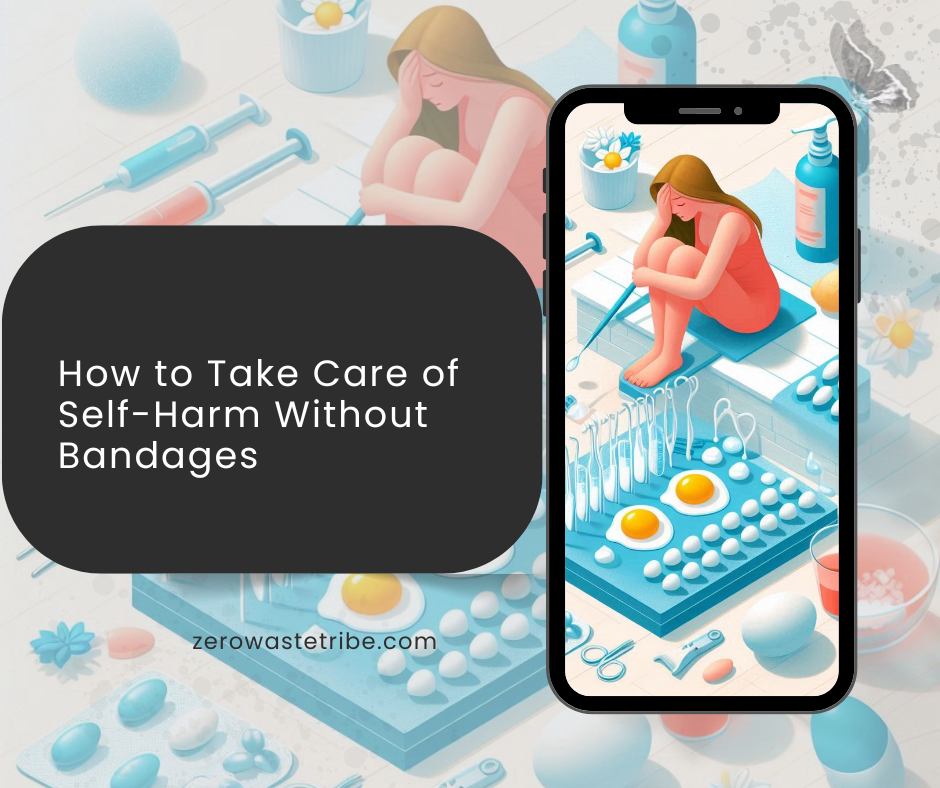Hey there. This isn’t an easy post to write, but it’s one I wish I’d found years ago when I was sitting alone in my bedroom at 3 AM, trying to figure out what to do without proper supplies. I’ve been there – that moment of panic when you realize you don’t have what you need, and the stores are closed. While I always recommend having proper medical supplies, I want to share what I’ve learned about managing these situations safely when you’re caught unprepared.

What I’ve Learned the Hard Way
Look, I’m not a doctor. I’m just someone who’s been through this and spent countless hours researching and learning from others in similar situations. Over the years, I’ve discovered some ways to take care of myself when I didn’t have access to proper supplies. I’m sharing these not because they’re ideal – they’re not – but because I know sometimes we need to work with what we have.
The T-Shirt Trick That Saved Me
One night, when I was out of bandages and too anxious to wake anyone up, I discovered that a clean cotton t-shirt could be a lifesaver. Literally. Here’s what I did, and what I’ve learned works best:
First, grab the cleanest, whitest t-shirt you can find. I prefer white because it makes it easier to spot any signs of infection later. Cut it into strips – they don’t have to be perfect, just about as wide as four fingers together. I used to try to tear them, but trust me, cutting them works better if you have scissors handy.
I know it might seem obvious, but wash your hands first. Like, really wash them. I sing “Happy Birthday” twice in my head while I do it. Yeah, I feel silly, but it works.
My Kitchen Cabinet First Aid Station
You know what’s wild? Your kitchen probably has better wound care supplies than you realize. I discovered this one night when I was desperate, and it changed everything. Here’s what I’ve found works:
That salt in your kitchen? It’s actually amazing for cleaning. I mix one teaspoon with a cup of warm water. It stings less than regular tap water and helps keep things clean. I learned this from my grandmother, who used it for everything, and later found out there’s actual science behind it.
And honey? Pure honey, not the processed stuff, is actually incredible. I thought it was an old wives’ tale until I researched it. Just make sure it’s real honey. I keep those little packets from cafes specifically for emergencies now.
The Sock Method (Yes, Really)
Okay, this might sound weird, but clean socks have saved me more than once. They’re actually perfect because they’re:
- Usually clean (if you grab them from your drawer)
- Already the right shape for wrapping
- Gentle on your skin
- Easy to secure
I used to feel embarrassed about using socks until I read about how soldiers in various wars used similar makeshift solutions. Sometimes you just have to work with what you have.
What I Keep in My Emergency Kit Now
After years of trial and error, I’ve put together what I call my “just in case” kit. It’s not perfect, but it helps me feel more prepared:
I keep everything in an old plastic container that used to hold cookies (after washing it thoroughly, of course). Inside, I have:
- Clean white t-shirt strips (pre-cut because who wants to cut fabric in a crisis?)
- A few pairs of new, white socks
- Salt packets from takeout places
- Some honey packets
- Regular black tea bags
- Clean paper towels
- Small scissors
Real Talk About Daily Care
I’ve learned that caring for yourself isn’t just about the initial moment. It’s about the days that follow. Here’s what works for me:
When I wake up, I gently clean everything with my salt water mix. I found out that hot showers, which I used to think were good, can actually make things worse. Lukewarm water is better. I change whatever covering I’m using at least twice a day – morning and night. More if it gets wet or dirty.
When to Get Help (From Someone Who Waited Too Long)
I’m going to be really honest here – I’ve made the mistake of waiting too long to get help, and I don’t want you to do the same. One time, I thought I could handle things on my own, and I ended up with an infection that scared me enough to finally talk to someone.
Watch out for:
- If the area feels hot and looks really red
- If you see red lines coming from it
- If it starts to smell different
- If you feel feverish or just “off”
These aren’t just guidelines from a medical textbook – they’re signs I’ve learned to take seriously from experience.
Moving Forward Together
Here’s the thing – while everything I’ve shared here works in a pinch, it’s not the whole answer. I know that now. These are emergency solutions for those moments when you feel stuck, but you deserve proper care and support.
I spent years figuring this out alone before I finally started reaching out. Now I know there are people who get it – who understand without judgment and want to help. Whether it’s a crisis line, a trusted friend, or a professional, you don’t have to figure this out by yourself like I did.
Take it from someone who’s been there – you’re stronger than you think, but you don’t have to be strong alone.
Disclaimer: Everything I’ve shared comes from personal experience and research, but I’m not a medical professional. These are emergency solutions for when proper supplies aren’t available.








